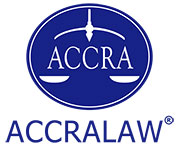
ACCRALAW Tower, 2nd Ave. Cor. 30th St., Bonifacio Global City
Taguig City, Metro Manila, Philippines
Tel: (632) 830-8000, / Fax (632) 4037007 or (632) 4037008
E: adlencio@accralaw.com W: www.accralaw.com
 Oxford Dictionaries’ Word of the Year for 2016 is “post-truth” — an adjective defined as “relating to or denoting circumstances in which objective facts are less influential in shaping public opinion than appeals to emotion and personal belief”. The popularity of the word is attributed to the proliferation of fake news online.
Oxford Dictionaries’ Word of the Year for 2016 is “post-truth” — an adjective defined as “relating to or denoting circumstances in which objective facts are less influential in shaping public opinion than appeals to emotion and personal belief”. The popularity of the word is attributed to the proliferation of fake news online.
In recent years, the international community has seen a rise in the use of fake news as a strategic tool. In an effort to minimise the claimed deleterious effects of fake news, policymakers are now exploring ways to regulate fake news online. German lawmakers have proposed a regulation where social media sites can face hefty fines if they do not remove fake news posted through their websites. Similar calls have begun in other EU countries.
In the Philippines, Senator Francis Pangilinan filed a resolution directing the appropriate Senate committee to conduct an inquiry on the proliferation of fake news on social media websites, particularly on Facebook, and to determine the possibility of amending the Cybercrime Prevention Act of 2012 to penalise these websites. Senator Pangilinan went on to state that Facebook may be considered as a “de facto media company or publisher” and should thus be accountable for the content it “distributes and allows to be distributed”.
However, the regulation of fake news is far from simple. Is the mere act of providing a platform in which fake news articles are posted sufficient to hold them liable? Would a law imposing criminal liability on that basis not be unconstitutional?
In the ruling of the Supreme Court in Disini v Secretary of Justice, the Court held that the mere act of sharing a libellous article cannot serve as the basis for criminal liability, and that authorship of the libellous article should still determine responsibility.
The arguments for or against culpability for fake news would depend on the characterisation of companies such as Facebook and Twitter. It may be argued that these companies are mere intermediaries, and should therefore not be held liable for the contents of articles posted by their users. Borrowing from the example of the Court in Disini, if a person posts on an office bulletin board a libellous statement, others who commented on the poster cannot be criminally liable as they are not the authors of the libellous statement. Should the person who provided the bulletin board then be held liable?
On the other hand, social media platforms may also be characterised as de facto media companies or publishers, as the resolution proposes. In such case, the legal theory would hinge on the claimed intervention of the platform in the publication of fake news.
If Congress legislates measures penalising these companies, the latter may need to draft more comprehensive censorship policies based on objective criteria. How these policies would be operationalised must also be thoroughly reviewed by legal advisers to minimise potential areas of exposure, ie grounds for lawsuits which users may bring as a result of any censorship effort. The first line of defense to these lawsuits is a review and revision of the social media platforms’ terms of engagement with their users.
Further, there would inevitably be grey areas in the regulation of fake news. Even medical or scientific claims posted in some articles are clouded with controversy. Thus, websites would then have the obligation not only to screen obviously fake news articles but also to determine the truth of debatable statements posted through their platforms.
Facebook has already collaborated with external fact-checkers to address the fake news problem. However, it is still uncertain whether such efforts can be used to interpose a “good faith” defence and repel liability. Social media sites would still face a big risk of being exposed to prosecution for failure to screen articles, despite best efforts, in the absence of codified points of action to be required from these companies.
Most importantly, the question that needs to be answered is should fake news be the subject of government regulation in the first place? Practically speaking, penalising social media platforms for allowing fake news articles may also serve as an indirect prohibition against fake news. Thus, from the point of view of the article writer, it is important to consider whether fake news enjoys the protection of the right to freedom of expression.
At present, dishonesty per se is not punishable. Even lies can be considered protected speech, provided they are not libellous. The right to freedom of expression does not have a correlative obligation to tell the truth.
Nonetheless, jurisprudence provides that speech may be curtailed should its utterance result in a clear and present danger which Congress has a right to prevent. Speech may also be curtailed if the interest of the government in repressing speech outweighs the interest of the writer. It is thus up to the government to show how the regulation of fake news can be justified.
(Note: This article was first published in Business World, a newspaper of general circulation in the Philippines)


